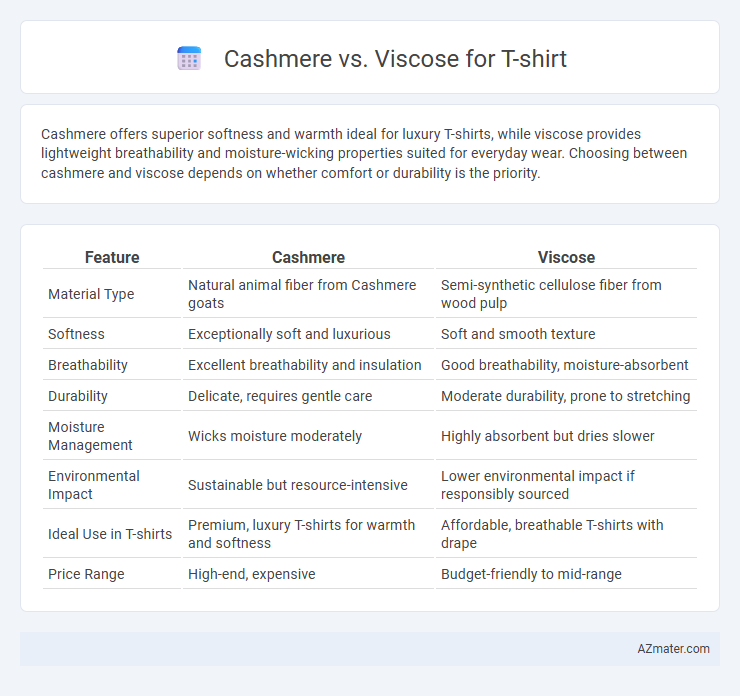Cashmere offers superior softness and warmth ideal for luxury T-shirts, while viscose provides lightweight breathability and moisture-wicking properties suited for everyday wear. Choosing between cashmere and viscose depends on whether comfort or durability is the priority.
Table of Comparison
| Feature | Cashmere | Viscose |
|---|---|---|
| Material Type | Natural animal fiber from Cashmere goats | Semi-synthetic cellulose fiber from wood pulp |
| Softness | Exceptionally soft and luxurious | Soft and smooth texture |
| Breathability | Excellent breathability and insulation | Good breathability, moisture-absorbent |
| Durability | Delicate, requires gentle care | Moderate durability, prone to stretching |
| Moisture Management | Wicks moisture moderately | Highly absorbent but dries slower |
| Environmental Impact | Sustainable but resource-intensive | Lower environmental impact if responsibly sourced |
| Ideal Use in T-shirts | Premium, luxury T-shirts for warmth and softness | Affordable, breathable T-shirts with drape |
| Price Range | High-end, expensive | Budget-friendly to mid-range |
Cashmere vs Viscose: Key Differences Explained
Cashmere offers luxurious softness, superior warmth, and natural breathability, making it ideal for premium T-shirts, whereas viscose provides a smooth, lightweight texture with excellent moisture-wicking properties at a more affordable price point. Cashmere fibers are sourced from the undercoat of Cashmere goats, resulting in durability and insulation, while viscose is a semi-synthetic fiber derived from cellulose, prone to less resilience but highly versatile in fabric blends. Choosing between cashmere and viscose depends on prioritizing natural luxury and warmth versus cost-effectiveness and easy care in T-shirt fabric selection.
Origins and Production Processes
Cashmere is derived from the soft undercoat fibers of cashmere goats primarily found in Mongolia, China, and Nepal, harvested through a delicate combing process during molting season. Viscose is a semi-synthetic fiber made from cellulose extracted from wood pulp, commonly sourced from beech, pine, or eucalyptus trees, produced through a chemical-intensive process involving carbon disulfide and sodium hydroxide. The natural origin and labor-intensive harvesting of cashmere contrast with the industrial-scale, chemically-driven viscose production, impacting both environmental footprints and tactile qualities in T-shirt fabrics.
Softness and Comfort: Which Feels Better?
Cashmere offers unmatched softness and luxurious comfort due to its fine, natural fibers that provide warmth without heaviness, making it ideal for premium T-shirts. Viscose, a semi-synthetic fiber made from regenerated cellulose, delivers a smooth, silky feel and breathability, offering a cooler and lighter option for everyday wear. While cashmere excels in plush softness, viscose provides superior moisture-wicking properties and flexibility, catering to different comfort preferences.
Breathability and Climate Suitability
Cashmere offers excellent breathability and insulation, making it suitable for cooler climates and providing warmth without overheating. Viscose, a semi-synthetic fiber derived from cellulose, excels in moisture absorption and air circulation, making it ideal for warm and humid conditions due to its lightweight and breathable properties. When choosing between cashmere and viscose for t-shirts, consider cashmere for soft warmth and viscose for superior breathability and cooling comfort in hot weather.
Durability and Longevity Comparison
Cashmere T-shirts offer superior longevity due to their natural fiber strength and resistance to pilling, making them highly durable with proper care. Viscose T-shirts, while soft and breathable, generally have lower durability as the semi-synthetic fiber is more prone to wear, stretching, and degradation over time. Choosing cashmere ensures long-lasting quality, whereas viscose requires more frequent replacement due to its reduced tensile strength and susceptibility to damage.
Style and Appearance: Which Looks Best?
Cashmere T-shirts exude luxury and softness with a refined, plush texture and natural luster that elevates any outfit, creating a sophisticated look. Viscose T-shirts feature a smooth, silky finish with a slight sheen that drapes elegantly on the body, offering a modern and polished appearance. While cashmere delivers a classic, upscale vibe, viscose provides vibrant color retention and versatility, making both materials stylish choices depending on the desired aesthetic.
Maintenance and Care Instructions
Cashmere T-shirts require gentle hand washing with cold water and mild detergent to preserve softness and prevent damage, while viscose T-shirts need careful washing in cold water to avoid shrinking and color fading. Drying cashmere flat on a towel is essential to maintain shape, whereas viscose should be air-dried away from direct sunlight to prevent fiber weakening. Both fabrics benefit from low heat ironing or steaming to reduce wrinkles without compromising fabric quality.
Environmental Impact: Sustainability Factors
Cashmere production has a significant environmental impact due to intensive grazing, leading to land degradation and increased greenhouse gas emissions, while viscose manufacturing involves deforestation and chemical use, contributing to biodiversity loss and water pollution. Sustainable viscose options, such as lyocell or TENCEL(tm), use closed-loop processes that recycle solvents and reduce environmental harm. Choosing eco-friendly viscose fibers often results in lower carbon footprints and less ecological damage compared to traditional cashmere sourcing.
Price and Affordability
Cashmere T-shirts are generally priced significantly higher due to the luxurious nature and rarity of cashmere fibers, often costing several times more than viscose options. Viscose T-shirts offer an affordable alternative while maintaining a soft, breathable feel, making them suitable for budget-conscious consumers seeking comfort and style. The price gap between cashmere and viscose underscores the accessibility of viscose for everyday wear compared to the premium investment required for cashmere garments.
Choosing the Best T-shirt Material for You
Cashmere offers exceptional softness and warmth, making it ideal for luxury T-shirts suited for cooler weather, while viscose provides a lightweight, breathable, and moisture-wicking fabric perfect for hot climates or active wear. Viscose's smooth texture and drape enhance comfort and style, but it may lack the durability and insulating properties of cashmere. Consider climate, intended use, and care requirements when choosing between cashmere's premium comfort and viscose's versatility for your T-shirt material.

Infographic: Cashmere vs Viscose for T-shirt
 azmater.com
azmater.com